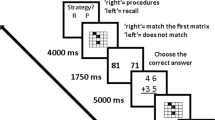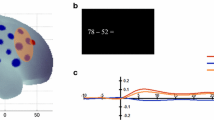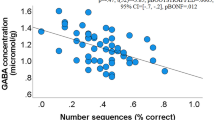Abstract
Mathematical abilities are essential for an individual, as they predict career prospects among many other abilities. However, little is known about whether neural correlates of arithmetic problem difficulty differ between individuals with high and low math ability. For instance, the difficulty of two-digit addition and subtraction increases whenever a carry or borrow operation is required. Therefore, we systematically investigated the spatial and temporal neural correlates of the carry and borrow effects for high and low performers in a written production paradigm using combined functional near-infrared spectroscopy (fNIRS) and event-related potential (ERP) measurements. Effects of arithmetic difficulty interacted with an individual’s math ability. High performers showed increased frontal activation especially in the left inferior frontal gyrus associated with the carry and borrow effects, whereas low performers did not. Furthermore, high and low performers even differed in their early processing of the borrow effect, as reflected by differences in slow waves at 1000–1500 ms at frontal sites. We conclude that the processing of arithmetic difficulty relies on an individual’s mathematical ability, and suggest that individual differences should be taken into account when investigating mental arithmetic in an ecologically valid assessment.







Similar content being viewed by others
References
Amalric M, Dehaene S (2016) Origins of the brain networks for advanced mathematics in expert mathematicians. PNAS 113(18):4909–4917. https://doi.org/10.1073/pnas.1603205113
Ansari D, Grabner RH, Koschutnig K, Reishofer G, Ebner F (2011) Individual differences in mathematical competence modulate brain responses to arithmetic errors: an fMRI study. Learn Individ Differ 21(6):636–643. https://doi.org/10.1016/j.lindif.2011.07.013
Arsalidou M, Taylor MJ (2011) Is 2 + 2 = 4? Meta-analyses of brain areas needed for numbers and calculations. Neuroimage 54(3):2382–2393. https://doi.org/10.1016/j.neuroimage.2010.10.009
Artemenko C, Moeller K, Huber S, Klein E (2015). Differential influences of unilateral tDCS over the intraparietal cortex on numerical cognition. Front Hum Neurosci. https://doi.org/10.3389/fnhum.2015.00110
Caviola S, Mammarella IC, Cornoldi C, Lucangeli D (2012) The involvement of working memory in children’s exact and approximate mental addition. J Exp Child Psychol 112(2):141–160. https://doi.org/10.1016/j.jecp.2012.02.005
Corsi PM (1973) Human memory and the medial temporal region of the brain. ProQuest Inf Learn 1–78
Cowan N (1988) Evolving conceptions of memory storage, selective attention, and their mutual constraints within the human information-processing system. Psychol Bull 104(2):163–191. https://doi.org/10.1037/0033-2909.104.2.163
Cui X, Bray S, Reiss AL (2010) Functional near infrared spectroscopy (NIRS) signal improvement based on negative correlation between oxygenated and deoxygenated hemoglobin dynamics. Neuroimage 49(4):3039–3046. https://doi.org/10.1016/j.neuroimage.2009.11.050
Dehaene S, Cohen L (1995) Towards an anatomical and functional model of number processing. Math Cogn 1:83–120
Dehaene S, Tzourio N, Frak V, Raynaud L, Cohen L, Mehler J, Mazoyer B (1996) Cerebral activations during number multiplication and comparison: a PET study. Neuropsychologia 34(11):1097–1106. https://doi.org/10.1016/0028-3932(96)00027-9
Deschuyteneer M (2005) The addition of two-digit numbers: exploring carry versus no-carry problems. Psychol Sci 47(1):74–83
Fehr T, Code C, Herrmann M (2007) Common brain regions underlying different arithmetic operations as revealed by conjunct fMRI-BOLD activation. Brain Res 1172:93–102. https://doi.org/10.1016/j.brainres.2007.07.043
Fürst AJ, Hitch GJ (2000) Separate roles for executive and phonological components of working memory in mental arithmetic. Mem Cogn 28(5):774–782. https://doi.org/10.3758/BF03198412
Geary DC, Frensch PA, Wiley JG (1993) Simple and complex mental subtraction: strategy choice and speed-of-processing differences in younger and older adults. Psychol Aging 8(2):242–256
Göbel SM, Moeller K, Pixner S, Kaufmann L, Nuerk H-C (2014) Language affects symbolic arithmetic in children: the case of number word inversion. J Exp Child Psychol 119(1):17–25. https://doi.org/10.1016/j.jecp.2013.10.001
Grabner RH, Ansari D, Reishofer G, Stern E, Ebner F, Neuper C (2007) Individual differences in mathematical competence predict parietal brain activation during mental calculation. Neuroimage 38(2):346–356. https://doi.org/10.1016/j.neuroimage.2007.07.041
Grabner RH, Reishofer G, Koschutnig K, Ebner F (2011) Brain correlates of mathematical competence in processing mathematical representations. Front Hum Neurosci 5:130. https://doi.org/10.3389/fnhum.2011.00130
Hinault T, Lemaire P (2016) What does EEG tell us about arithmetic strategies? A review. Int J Psychophysiol 106:115–126. https://doi.org/10.1016/j.ijpsycho.2016.05.006
Hitch G (1978) The role of short-term working memory in mental arithmetic. Cogn Psychol 323:302–323
Imbo I, LeFevre J-A (2010) The role of phonological and visual working memory in complex arithmetic for Chinese- and Canadian-educated adults. Mem Cogn 38(2):176–185. https://doi.org/10.3758/MC.38.2.176
Imbo I, Vandierendonck A, De Rammelaere S (2007a) The role of working memory in the carry operation of mental arithmetic: number and value of the carry. Q J Exp Psychol 60(5):708–731. https://doi.org/10.1080/17470210600762447
Imbo I, Vandierendonck A, Vergauwe E (2007b) The role of working memory in carrying and borrowing. Psychol Res 71(4):467–483. https://doi.org/10.1007/s00426-006-0044-8
Kazui H, Kitagaki H, Mori E (2000) Cortical activation during retrieval of arithmetical facts and actual calculation: a functional magnetic resonance imaging study. Psychiatry Clin Neurosci 54(4):479–485. https://doi.org/10.1046/j.1440-1819.2000.00739.x
Klein E, Nuerk H-C, Wood G, Knops A, Willmes K (2009) The exact vs. approximate distinction in numerical cognition may not be exact, but only approximate: how different processes work together in multi-digit addition. Brain Cogn 69(2):369–381. https://doi.org/10.1016/j.bandc.2008.08.031
Klein E, Moeller K, Dressel K, Domahs F, Wood G, Willmes K, Nuerk H-C (2010a) To carry or not to carry—is this the question? Disentangling the carry effect in multi-digit addition. Acta Physiol (Oxf) 135(1):67–76. https://doi.org/10.1016/j.actpsy.2010.06.002
Klein E, Willmes K, Dressel K, Domahs F, Wood G, Nuerk H-C, Moeller K (2010b) Categorical and continuous—disentangling the neural correlates of the carry effect in multi-digit addition. Behav Brain Funct 6(1):70. https://doi.org/10.1186/1744-9081-6-70
Kong J, Wang Y, Shang H, Yang X, Zhuang D (1999) Brain potentials during mental arithmetic-effects of problem difficulty on event-related brain potentials. Neurosci Lett 260(3):169–172. https://doi.org/10.1016/S0304-3940(98)00974-4
Kong J, Wang C, Kwong K, Vangel M, Chua E, Gollub R (2005) The neural substrate of arithmetic operations and procedure complexity. Cogn Brain Res 22(3):397–405. https://doi.org/10.1016/j.cogbrainres.2004.09.011
Kreuzpointner L, Lukesch H, Horn W (2013) Leistungsprüfsystem 2. Hogrefe, Göttingen
LeFevre J-A, Shanahan T, DeStefano D (2004) The tie effect in simple arithmetic: an access-based account. Mem Cogn 32(6):1019–1031. https://doi.org/10.3758/BF03196878
Lemaire P, Callies S (2009) Children’s strategies in complex arithmetic. J Exp Child Psychol 103(1):49–65. https://doi.org/10.1016/j.jecp.2008.09.007
Menon V, Rivera SM, White CD, Glover GH, Reiss AL (2000a) Dissociating prefrontal and parietal cortex activation during arithmetic processing. Neuroimage 12(4):357–365. https://doi.org/10.1006/nimg.2000.0613
Menon V, Rivera SM, White CD, Eliez S, Glover GH, Reiss AL (2000b) Functional optimization of arithmetic processing in perfect performers. Cogn Brain Res 9(3):343–345. https://doi.org/10.1016/S0926-6410(00)00010-0
Moeller K, Klein E, Nuerk H-C (2011a) No) small adults: children’s processing of carry addition problems. Dev Neuropsychol 36(6):702–720. https://doi.org/10.1080/87565641.2010.549880
Moeller K, Klein E, Nuerk H-C (2011b) Three processes underlying the carry effect in addition—evidence from eye tracking. Br J Psychol 102(3):623–645. https://doi.org/10.1111/j.2044-8295.2011.02034.x
Moeller K, Pixner S, Zuber J, Kaufmann L, Nuerk H-C (2011c) Early place-value understanding as a precursor for later arithmetic performance—a longitudinal study on numerical development. Res Dev Disabil 32(5):1837–1851. https://doi.org/10.1016/j.ridd.2011.03.012
Muluh ET (2011) A review of event-related potential (ERP) components employed in mental arithmetic processing studies. J Neurol Neurophysiol. https://doi.org/10.4172/2155-9562.S6-001
Nuerk H-C, Geppert BE, van Herten M, Van, Willmes K (2002) On the impact of different number representations in the number bisection task. Cortex 38:691–715. https://doi.org/10.1016/S0010-9452(08)70038-8
Nuerk H-C, Moeller K, Klein E, Willmes K, Fischer MH (2011) Extending the mental number line. J Psychol (Zeitschrift Für Psychologie) 219(1):3–22. https://doi.org/10.1027/2151-2604/a000041
Núñez-Peña MI (2008) Effects of training on the arithmetic problem-size effect: an event-related potential study. Exp Brain Res 190(1):105–110. https://doi.org/10.1007/s00221-008-1501-y
Núñez-Peña MI, Honrubia-Serrano ML, Escera C (2005) Problem size effect in additions and subtractions: An event-related potential study. Neurosci Lett 373(1):21–25. https://doi.org/10.1016/j.neulet.2004.09.053
Núñez-Peña MI, Cortiñas M, Escera C (2006) Problem size effect and processing strategies in mental arithmetic. Neuroreport 17(4):357–360. https://doi.org/10.1097/01.wnr.0000203622.24953.c2
Núñez-Peña MI, Gracia-Bafalluy M, Tubau E (2011) Individual differences in arithmetic skill reflected in event-related brain potentials. Int J Psychophysiol 80(2):143–149. https://doi.org/10.1016/j.ijpsycho.2011.02.017
Oldfield R (1971) The assessment and analysis of handedness: the Edinburgh inventory. Neuropsychologia 9(1):97–113. https://doi.org/10.1016/0028-3932(71)90067-4
Oostenveld R, Praamstra P (2001) The five percent electrode system for high-resolution EEG and ERP measurements. Clin Neurophysiol 112(4):713–719. https://doi.org/10.1016/S1388-2457(00)00527-7
Owen AM, Mcmillan KM, Laird AR, Bullmore E (2005) N-back working memory paradigm: a meta-analysis of normative functional neuroimaging studies. Hum Brain Mapp 25:46–59. https://doi.org/10.1002/hbm.20131
Park J, Park DC, Polk Ta (2012). Parietal functional connectivity in numerical cognition. Cereb Cortex, 1–9. https://doi.org/10.1093/cercor/bhs193
Pauli P, Lutzenberger W, Rau H, Birbaumer N, Rickard TC, Yaroush RA, Bourne LE (1994) Brain potentials during mental arithmetic: effects of extensive practice and problem difficulty. Cogn Brain Res 2(1):21–29. https://doi.org/10.1016/0926-6410(94)90017-5
Pauli P, Lutzenberger W, Birbaumer N, Rickard TC, Bourne LE Jr (1996) Neurophysiological correlates of mental arithmetic. Psychophysiology. https://doi.org/10.1111/j.1469-8986.1996.tb02428.x
Pletzer B, Kronbichler M, Nuerk H-C, Kerschbaum HH (2015). Mathematics anxiety reduces default mode network deactivation in response to numerical tasks. Front Hum Neurosci. https://doi.org/10.3389/fnhum.2015.00202
Ploner N (2014) RON (ReadOutNumbers) [Computer software]. Tuebingen, Germany
Prado J, Mutreja R, Zhang H, Mehta R, Desroches AS, Minas JE, Booth JR (2011) Distinct representations of subtraction and multiplication in the neural systems for numerosity and language. Hum Brain Mapp 32(11):1932–1947. https://doi.org/10.1002/hbm.21159
Rickard TC, Romero SG, Basso G, Wharton C, Flitman S, Grafman J (2000) The calculating brain: an fMRI study. Neuropsychologia 38(3):325–335
Rivera SM, Reiss AL, Eckert MA, Menon V (2005) Developmental changes in mental arithmetic: evidence for increased functional specialization in the left inferior parietal cortex. Cereb Cortex 15(11):1779–1790. https://doi.org/10.1093/cercor/bhi055
Rorden C, Brett M (2000) Stereotaxic display of brain lesions. Behav Neurol 12(4):191–200. https://doi.org/10.1155/2000/421719
Rueckert L, Lange N, Partiot A, Appollonio I, Litvan I, Le Bihan D, Grafman J (1996) Visualizing cortical activation during mental calculation with functional MRI. Neuroimage 3:97–103. https://doi.org/10.1006/nimg.1996.0011
Rypma B, Berger JS, Esposito MD (2002) The influence of working-memory demand and subject performance on prefrontal cortical activity. J Cogn Neurosci 14(5):721–731. https://doi.org/10.1162/08989290260138627
Sankoh AJ, Huque MF, Dubey SD (1997) Some comments on frequently used multiple endpoint adjustment methods in clinical trials. Stat Med 16(22):2529–2542. https://doi.org/10.1002/(SICI)1097-0258(19971130)16:22<2529::AID-SIM692>3.0.CO;2-J
Seyler DJ, Kirk EP, Ashcraft MH (2003) Elementary subtraction. J Exp Psychol Learn Mem Cogn 29(6):1339–1352. https://doi.org/10.1037/0278-7393.29.6.1339
Singh AK, Okamoto M, Dan H, Jurcak V, Dan I (2005) Spatial registration of multichannel multi-subject fNIRS data to MNI space without MRI. Neuroimage 27(4):842–851. https://doi.org/10.1016/j.neuroimage.2005.05.019
Soltanlou M, Pixner S, Nuerk H-C (2015) Contribution of working memory in multiplication fact network in children may shift from verbal to visuo-spatial: a longitudinal investigation. Front Psychol 6:1–10. https://doi.org/10.3389/fpsyg.2015.01062
Soltanlou M, Artemenko C, Dresler T, Haeussinger FB, Fallgatter AJ, Ehlis A-C, Nuerk H-C (2017) Increased arithmetic complexity is associated with domain-general but not domain-specific magnitude processing in children: a simultaneous fNIRS-EEG study. Cogn Affect Behav Neurosci 17:724–736. https://doi.org/10.3758/s13415-017-0508-x
Soltanlou M, Artemenko C, Ehlis A-C, Huber S, Fallgatter AJ, Dresler T, Nuerk H-C (2018) Reduction but no shift in brain activation after arithmetic learning in children: a simultaneous fNIRS-EEG study. Sci Rep 8:1707. https://doi.org/10.1038/s41598-018-20007-x
Tadel F, Baillet S, Mosher JC, Pantazis D, Leahy RM (2011) Brainstorm: a user-friendly application for MEG/EEG analysis. Comput Intell Neurosci. https://doi.org/10.1155/2011/879716
Tsuzuki D, Jurcak V, Singh AK, Okamoto M, Watanabe E, Dan I (2007) Virtual spatial registration of stand-alone fNIRS data to MNI space. Neuroimage 34(4):1506–1518. https://doi.org/10.1016/j.neuroimage.2006.10.043
Tzourio-Mazoyer N, Landeau B, Papathanassiou D, Crivello F, Etard O, Delcroix N, Joliot M (2002) Automated anatomical labeling of activations in SPM using a macroscopic anatomical parcellation of the MNI MRI single-subject brain. Neuroimage 15:273–289. https://doi.org/10.1006/nimg.2001.0978
Verner M, Herrmann MJ, Troche SJ, Roebers CM, Rammsayer TH (2013) Cortical oxygen consumption in mental arithmetic as a function of task difficulty: a near-infrared spectroscopy approach. Front Hum Neurosc 7:1–9. https://doi.org/10.3389/fnhum.2013.00217
Winer BJ, Brown DR, Michels KM (1971) Statistical principles in experimental design. McGraw-Hill, New York. https://doi.org/10.1002/0471458503.ch4
Yang Y, Zhong N, Friston K, Imamura K, Lu S, Li M, Hu B (2017). The functional architectures of addition and subtraction: Network discovery using fMRI and DCM. Hum Brain Mapp. https://doi.org/10.1002/hbm.23585
Yi-Rong N, Si-Yun S, Zhou-Yi G, Si-Run L, Yun B, Song-Hao L, Chan WY (2011) Dissociated brain organization for two-digit addition and subtraction: an fMRI investigation. Brain Res Bull 86:395–402. https://doi.org/10.1016/j.brainresbull.2011.08.016
Acknowledgements
This research was funded by the LEAD Graduate School & Research Network [GSC1028], which is funded within the framework of the Excellence Initiative of the German federal and state governments supporting CA and TD. This research was further funded by a grant from the Science Campus Tuebingen, project 8.4 to HCN supporting MS. We acknowledge support by Deutsche Forschungsgemeinschaft and Open Access Publishing Fund of University of Tuebingen. Furthermore, we want to thank the lab of Ippeita Dan and Minako Uga for virtual registration of the fNIRS coordinates. Finally, we want to thank Marielle Borsche and Meryem Asiye Banabak for assistance in the measurements and Julianne Skinner for language proofreading of the paper.
Author information
Authors and Affiliations
Corresponding author
Electronic supplementary material
Below is the link to the electronic supplementary material.
Rights and permissions
About this article
Cite this article
Artemenko, C., Soltanlou, M., Dresler, T. et al. The neural correlates of arithmetic difficulty depend on mathematical ability: evidence from combined fNIRS and ERP. Brain Struct Funct 223, 2561–2574 (2018). https://doi.org/10.1007/s00429-018-1618-0
Received:
Accepted:
Published:
Issue Date:
DOI: https://doi.org/10.1007/s00429-018-1618-0




